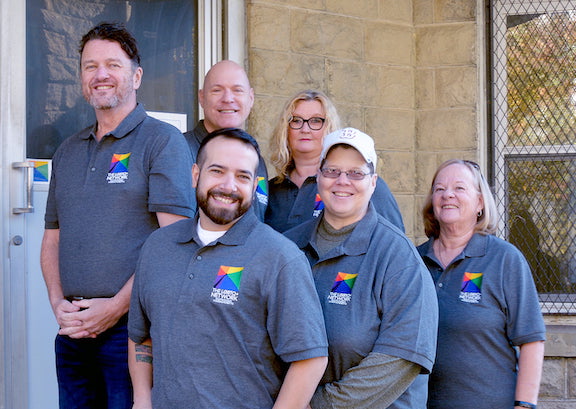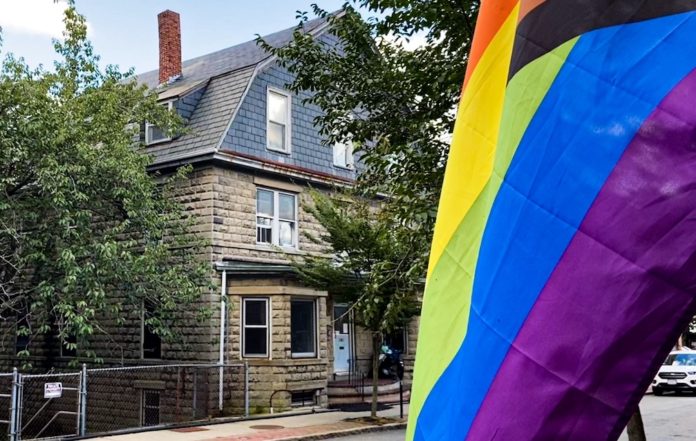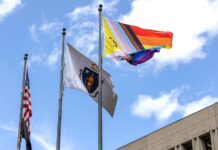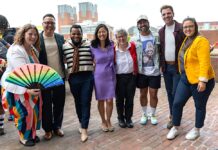[This article appears in the January/February 2022 issue of Boston Spirit magazine. Subscribe for free today.]
For Jackson, a transgender teenager from Westport, Massachusetts, just thinking about the South Coast LGBTQ+ Network‘s community center slated to open its doors toward the end of this year in downtown New Bedford is almost too much take in.
“It’s still kind of unreal that it’s happening,” he says. “A lot of people develop the mindset where you keep your expectations low because you’ll get disappointed. So right now, I’m kind of in the acceptance phase: I know there’s a building. It’s being worked on. I accept it.”
“Being a teenager,” he adds, “you’re already alone in your own way, but being transgender, personally I didn’t think another transgender person was out there in the world until I started becoming part of the community.” Having a safe space to connect in that community, says Jackson, would mean the different between “night and day.”
Frank Schmidt first heard about plans for the new community center at one of Fairhaven Council on Aging’s monthly dinners, where reps from the Network shared plans for the new facility and asked for volunteers. “I was looking to make friends, so I signed up,” says Schmidt, who lives in Assonet, just north of Fall River. “I was particularly attracted to the concept because it covers the full age spectrum: old people, young people, middle people.”
“The facility is going to be a positive even for people who don’t use it simply because it’s there,” he says. “They’ll know a safe and welcoming place is there, and if the individual chooses, they can feel perfectly comfortable walking in the door.”
“I wish I had this growing up,” says Antonio Rodrigues, an outreach specialist for Greater New Bedford Community Health Center and a member of the Network’s board of directors. “I’m 46 now, and I remember feeling like I was the only person in the world who was gay at the time. I wish I’d had a place to go where there were gay people who were strong, part of the community and committed and visible. I think this place is going to do that for a lot of people.”
Cynthia Cummings recently retired from her job as UMass Dartmouth’s dean of students and has since joined the Network’s corporate development committee. Once the center opens, she hopes to get involved in youth programming. “Especially for any young people who might be interested in going to college,” she says. “My background has always been focused on education. There’s a high percentage of LGBTQ youth who end up on the streets. One of the big efforts we’re engaged in at the Network is keeping them from being homeless, providing them with opportunities to see what their futures can look like.”
“This is going to be a fabulous center,” Cummings says. “I would like folks to understand how special it is and for them to come out and visit us once it’s open.”
The place
Imagine a safe space where LGBTQ+ people of all ages and letters of the rainbow can meet socially and access social services, educational programs and more. A facility complete with an art studio and gallery space, a computer/tech room outfitted for TV broadcasting, areas for meetings and all kinds of activities including music and performing arts, a kitchen and Internet café and four offices for legal, health and other professionals who specialize in the interests and needs of LGBTQ+ people.
Imagine a facility with multiple LGBTQ+ organizations sharing a space and working together.
Imagine that—and more—and you get the South Coast LGBTQ+ Network’s new community center right in downtown New Bedford at 60 Eight Street, right on the edge of the historic district.
The building’s own history began around 1908. The Neo-Georgian–style, four-story structure boasts some 4,480 square-feet of accessible space (complete with an elevator and gently graded entrance ramp, once the renovations are complete). It sits on an acre of land, which includes a grassy, private backyard area perfect for small gatherings.
The New Bedford Alliance for Gay and Lesbian Youth (NB-AGLY) was the first nonprofit to announce their plans to move in, and the Network is talking to other LGBTQ+ organizations about the possibility of sharing space at the center too. The Network itself was founded in 2014 by seven LGBTQ+ agencies and allied organizations that have grown together into a thriving partnership.
“Although technically we are renovating an existing space, we believe we are symbolically ‘breaking new ground’ because the new South Coast LGBTQ+ Center will offer to the LGBTQ+ community, as well as to their family and allies here, an elevated level of resources and visibility we’ve never had before,” says Network President Andy Pollack.

The plan
In 2016, the Network negotiated a deal with the city to purchase the building for $15,000 with a plan to restore and convert it into the community center. Meanwhile, they’ve been reaching out to their neighbors in the community to build and strengthen relationships. Along with businesses in the area, the Network’s local religious partners, for example, include New Bedford Friends, Grace Episcopal Church and the First Unitarian Church in New Bedford; and the Congregational Church, St. Peter’s Episcopal Church and Tifereth Israel Congregation in Dartmouth.
The government has proved a great partner, too.
“The city embracing our plans means, ‘We see you, we hear you, we accept you, we want you to feel a part of this community,” says Antonio Rodrigues. “It’s incredible.”
The Network estimates it will take $1.2 million to renovate the space according to plan. As of late 2021, they’d raised about half that, says Board Member Kerry Zeida, and that’s enough to get started on the exterior and begin working inside as the weather gets colder.
Corporate Development Committee Member Cynthia Cummings notes a recent $100,000 gift from Boston- and New Bedford-based Mayflower Wind. “It’s important for local businesses, especially those whose missions are civic-minded, to show they are inclusive. Many businesses right now are very much focused on a social justice mission, so this an opportunity for them to put their money where their mouths are.”
It’s also an opportunity for them to build a connection with our Network,” she adds. “For those interested in providing learning opportunities for their employers in the area of LGBTQ awareness, where they’re trying to diversity their workforces, we can be an asset for them.”
“From a fundraising perspective, we are doing very well in terms of reaching out to companies and other organizations for major sponsorships,” Zeida says. “To get us over the finish line, we also need individuals to step forward and support this effort with as much as they can spare to support the efforts that we are undertaking here.”
“If we are successful in our fundraising efforts,” he says, “by mid- to late summer we should be very far along, and next fall and winter, hopefully by December 2022, we will be able to open our doors to the community.”
“ To get us over the finish line, we also need individuals to step forward and support the efforts we are undertaking. ”
Kerry Zeida, South Coast LGBTQ+ Network
Looking forward
“When I came out, I was one of the lucky people,” says Frank Schmidt. “I faced very little difficulty, very little resistance from friends or family, so I want to pay that forward. I want to be a part of helping someone else’s process of coming out being very smooth. That will be my main motivation for coming to the center.”
“Young people are almost genetically attracted to an environment like this,” he says, “and opening it up and stating out front this is to be for all ages is a wonderful way to make it as inclusive as possible. I have yet to meet a senior gay person who wouldn’t be amenable to the idea of mingling with younger people. And if that turned into a mentoring relationship, so much the better.”
“I want to go there and spend as much time there as I can,” says Jackson, “especially seeing as I’d feel a lot safer in that building compared to other buildings. Transgender and nonbinary people—pretty much everybody in the community who gets ostracized—should know we’re not alone. Hopefully, this building will help them feel safe and be safe. It will save lives.”
Along with pitching in to help youth programing once the center opens, Cynthia Cummings says she’s also interested in participating in the Network’s programs for older LGBTQ people. “I’m now officially a senior citizen,” she says. “I guess I have been for a while. LGBTQ elders can be highly marginalized, and there’s a need for social space, a need for resources.”
“I am going to be there the day that it opens with bells,” says Antonio Rodrigues. “I would like to get involved in any way, shape or form. I’ve been in the social service field for very long time. Maybe I can do some of that work or help put some of that work together.”
“It’s going to be a community center,” he says. “A place where people can be themselves and create a safe space for themselves. I’m sure this is going to be a space where people will be coming out for the first time—to check things out and see what it’s like to feel welcome.”
More: sclgbtqnetwork.org; to make a donation, click here.
Not a subscriber? Sign up today for a free subscription to Boston Spirit magazine, New England’s premier LGBT magazine. We will send you a copy of Boston Spirit 6 times per year and we never sell/rent our subscriber information. Click HERE to sign up!









